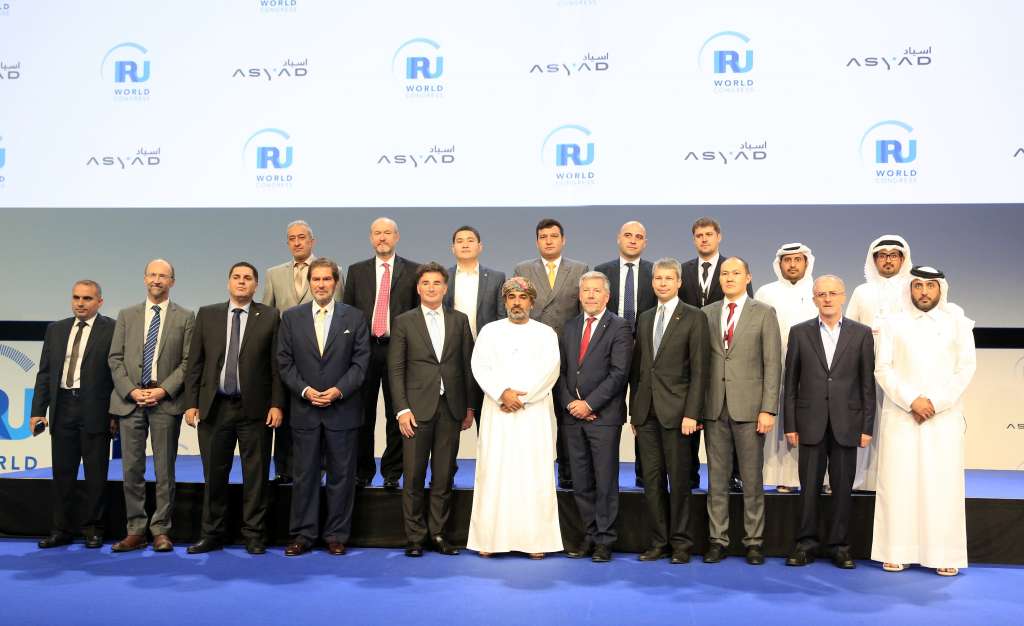The IRU World Congress wrapped up today with the signing of the Muscat Compact, a roadmap for the future of road transport, mobility, trade and logistics. As a principle-based framework for cooperation, it will bring the industry together to take control of its future by using innovation to overcome current challenges and uncertainty.
The Muscat Compact focuses on four key elements: talent, trade, environment and innovation. It spurs collective action and guides public-private collaboration at a local, national, regional and global level.
The Compact was discussed in a closed ministerial dialogue, examining how governments can work better with transport operators in supporting trade facilitation, building human capital, decarbonising and supporting innovation. Governments from 25 countries came together to plan a course of action to achieve industry objectives and global goals, notably as set out in the UN 2030 Agenda for Sustainable Development and the Sustainable Development Goals (SDGs).
The Muscat Compact was presented during the closing session by Emil Kaikiyev, Minister in charge of Energy and Infrastructure of the Eurasian Economic Commission, who called for collaboration between the public and private sectors in taking transport, trade and mobility forward. He said, “IRU has long advocated an end to silo approaches, with harmonisation and shared global best practices. This is more important now than ever, as we face accelerated change and also significant opportunities. The Muscat Compact is the beginning of a new proactive era for transport, where we act together to design our future and we start building it.”
Secretary General of IRU, Umberto de Pretto, added, “This is a defining moment for the industry. We can’t predict the future, but we can forge our own destiny within it. The survival of the industry – of global prosperity – depends on it.”
The Compact was one of many positive outcomes of the three-day global event, which saw global decision-makers come together to support transport operators in boosting trade facilitation, good regulation, digitalisation and intermodal efficiency. In addition, Mwasalat, Oman’s national transport company, signed a Memorandum of Understanding (MoU) with Busworld, the biggest and most experienced bus and coach exhibition in the world, to host the event in Muscat in 2021.
The final day of the Congress also explored avant-garde solutions from leading business figures who have successfully ridden the wave of disruption and prospered from innovation. André Borschberg, Co-Founder, CEO and Pilot of Solar Impulse expressed, “Innovation is all about pushing boundaries. It’s about having the vision to see what existing technology can do and the expertise to bring that vision to reality. It’s about having a license to fail, try again, fail again and eventually succeed. And it’s about courage.”
Dr. Rand Hindi of Snips.ai, added, “This is what the digital revolution is all about. It’s about using this artificial intelligence to make technology disappear in a way that you can just go about your day and not care about it anymore.”
The round table sessions focused on autonomous road transport, responding to new challenges in urban mobility, and reaping the benefits of innovative practices that can generate new revenue streams and optimize resources. “After three decades of globalisation, many companies expect their supply chains to shorten in the years ahead. But while some manufacturing processes will migrate ‘closer-to-home’, speeding the shift towards regionalisation, numerous well established and finely tuned supply chains will remain in place, adapting to serve expanding local markets. For businesses, supply chains may be shrinking, but the era of complex supply chain ecosystems is still far from being over,” said author, logistics expert and lecturer Mark Millar.
The IRU World Congress was organised by IRU and hosted by ASYAD in collaboration with the Ministry of Transport and Communications. Over 1,000 participants from more than 75 countries attended the three-day event.




